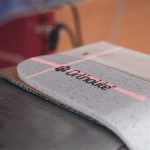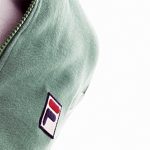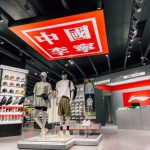Instantly transforming into one of the largest footwear companies in North America, DSW Inc. partnered with Authentic Brands Group (ABG) to acquire the Camuto Group, best known for the Vince Camuto brand and footwear licenses of Jessica Simpson and Lucky Brand. The total purchase prices was about $375 million.
Shares of DSW fell $4.17, or 12.8 percent, to $28.51 on Wednesday due to concerns over current operating losses at the acquired business as well as greater uncertainty tied to the new venture.
Under the terms of the deal, DSW will pay about $200 million to acquire all of Camuto’s global product, sourcing and design infrastructure, including operations in Brazil and China a new, state-of-the-art distribution center in New Jersey, in addition to existing working capital of approximately $100 million. DSW will also acquire the licensing rights for the Jessica Simpson footwear business, as well as the footwear and handbag licenses for Lucky Brand and Max Studio. Finally, DSW will acquire joint venture participation in the ED Ellen DeGeneres and Mercedes Castillo brands currently managed by the Camuto Group.
In a related transaction, DSW will contribute $56 million to acquire a 40 percent stake in the intellectual property of Camuto Group’s proprietary brands with ABG taking the majority stake of 60 percent. Brands include Vince Camuto, Louise et Cie, Sole Society, CC Corso Como and Enzo Angiolini. The partnership will focus on licensing the brands across existing lines in footwear, handbags and jewelry, and new category development with a focus on building out each brand’s lifestyle offerings.
ABG will hold a majority stake in the joint venture and will be responsible for the development, growth and global marketing of the brands.
“We welcome this team to our family and look forward to realizing Vince Camuto’s vision together,” said DSW’s CEO Roger Rawlins on a conference call with analysts. “This partnership transforms our organization into one of the largest footwear franchises in the North America with capabilities that enable us to reach customers across diverse points of sales, our own industry-leading DSW retail network and now new to our channel of wholesale, brand owned direct-to-consumer, licensing and international franchising.”
The Decision To Buy
Detailing how the decision to acquire Camuto Group came about, Rawlins noted that the company had built a “solid foundation” in retail since opening the first DSW off-price store 25 year ago and also developed a sizable business serving third-party retailers with its department stores partners. The recent acquisition of Town Shoes enabled DSW to enter Canada. While the combination of store expansion and comp gains has supported growth, the company has only realized “relatively modest market share gains considering the significant investment required.”
He further noted that over the last few years, DSW has recognized the importance of growing strong private labels to support a direct-to-consumer business. Rawlins added, “This is important because as the retail landscape evolves strong brands with the ability to build the direct-to-consumer model have captured increasing market share.”
He added, “So we’ve been on a journey to develop our own exclusive and proprietary brands to increase our competitive differentiation and have made good progress. However, to expand the business in a meaningful and substantial way, we need top-notch in-house design and sourcing capabilities.”
Private label currently accounts for about 10 percent of DSW’s mix.
As a result, DSW has been exploring whether to build or buy the design and brand building competencies to support a robust D2C portfolio. The company began going direct to factories and then partnered with a large design and sourcing entity to support its private-brand sourcing efforts. Ultimately, Rawlins said DSW determined that the cost and efforts required to build such capabilities from scratch would require significant capital investments and operating expenses, as well as require a steep learning curve to secure design, brand-building and sourcing expertise. Building rather than acquiring would also add significant risk into DSW’s organization that has limited manufacturing expertise.
That led DSW to consider acquiring a sourcing and design organization and Camuto Group wound up on the selling block in part due to the passing of founder Vince Camuto. Said Rawlins, ““Camuto Group given its successful track record of brand building, its reputation for high quality design and product standards, as well as the additional and immediate benefit of scale and design, sourcing, manufacturing, distribution and logistics.”
DSW noted that in 2017, Camuto Group generated total revenues of $435 million, 75 percent of which was in wholesale footwear sales led by the Vince Camuto brand. The company’s expansion of its retail network and the opening of its New Jersey distribution center created significant liquidity constraints and earnings pressure over the last three years. Along with the passing the the founder, the Camuto Group’s family decided to put the business up for sale.
Jared Poff, DSW’s CFO, said, “The timing of this sale gave us a rare opportunity to acquire the design, sourcing and brand-building capabilities that we need, coupled with a substantial expertise of an established business for a comparable price to building out our own infrastructure”.
Benefits to DSW
Overall, the benefits to DSW were cited as:
- A healthy brand portfolio with attractive growth prospects in wholesale and direct-to-consumer that can leverage DSW’s expertise and infrastructure;
- Substantial growth in Camuto’s third-party licensing and international distribution business in partnership with ABG;
- New revenue opportunities from a larger addressable market;
- A strategic partnership with ABG that leverages their expertise in brand management and marketing across various brands and platforms;
- Immediate access to a talent base in design, sourcing, marketing and sales to support the growth of DSW’s exclusive brands over time.
Poff said that with the acquisition, DSW increases exposure to new channels of distribution, secures a portfolio of intellectual property to establish a greater point of differentiation and reach a larger addressable market, and acquires a design and sourcing infrastructure that supports DSW’s existing business as well as an already-established Camuto Group business. DSW will also further reach millennial customers who shop for Camuto’s brands and other channels.
The partnership with ABG provides marketing and brand-building expertise, an expertise, which has allowed them to build an aggregate 230 million followers online and potential access to a portfolio of 33 lifestyle entertainment brands for future category development.
For Camuto Group, DSW expects to bring best-in-class operational expertise and retail innovation to accelerate the growth of their D2C business, distribution and logistics leverage and addition scale in sourcing. DSW’s 25 million reward members will also support provide Camuto Group’s product development.
The biggest fundamental change for DSW is its move into the wholesaling business with new capabilities to design and source to other retailers.
Said Rawlins, “We have the highest respect for the organization and look forward to preserving and growing the relationships established across the wholesale channel. Recognizing Camuto Group’s expertise in this area, we intend to integrate slowly, maintaining this line of business as separate and independent from our own retail operation, as we have done for the past 20 years with our affiliated businesses and most recently with our Canadian acquisition.”
The Camuto Group will maintain its existing headquarters in Connecticut and remain under the leadership of its long standing CEO, Alex Del Cielo.
The acquisition changes DSW’s business model from one that solely focused on North American retail to a model with new revenues from wholesale, licensing royalties and investment income. The company also reduces exposure to the moderate channel by increasing sales through department stores, regional chain, independent boutiques, pure play online and digital marketplaces. The move should reduce its exposure to the footwear category with the capacity to expand the acquired brands to adjacent categories such as handbags and apparel.
Due to an ill-timed/executed foray into company-owned retail, combined with the construction and complications of opening a state-of-the-art distribution facility, Camuto Group is currently operating at a loss and the acquisition will be dilutive to earnings in the near term. Poff said that while the Camuto Group has been challenged with supply-chain constraints over the recent past, DSW believes it has the financial resources and credit strength to allow them to return to a more normalized posture over the next 12 to 18 months.
“We firmly believe the transaction creates significant revenue and profit synergies that exceed the benefits of simply integrating the Camuto Group,” said Poff. “These synergies come from the fact that DSW is already one of the largest customers of Jessica Simpson and Lucky footwear. The gross profit we recapture for the enterprise versus leaving it to a third-party sets this business on a relatively quick path to accretion even when taking into consideration the new royalties to be paid to the joint venture between Authentic Brands and DSW.”
Under the ABG joint venture, DSW will also earn equity income on royalties from the licensing of brands new and existing partners. Said Poff, “These immediate benefits deliver returns on investment sooner, and if we were to build these capabilities from the ground up and with much less execution risk. Based on anticipated synergies, we believe this transaction would generate significant earnings accretion long-term.”
The deal is expected to close at the end of DSW’s fiscal fourth quarter.
Analysts Reaction
Steve Marotta, who covers DSW for CL King, said he views the acquisition positively given the growth opportunities that should come from access to Camuto Group’s well-known brand portfolio as well as proven sourcing and design competency.
He added, “We steadfastly concede, however, immediately dilutive acquisitions are looked at askance by investors, with near-term multiple contraction evident and abiding in the short term. The ‘turnaround’ at CG’s operations to positive EBITDA, we believe, will occur in a three- to six-month time frame, with closer-to-normal operating metrics generated within one to two years. In other words, the stock’s multiple could compress for a couple of quarters, but ultimately recover.”
CL King has a “Buy” rating on DSW’s shares at a price target of $38.00.
Christopher Svezia, at Webdush, which has a “Neutral” rating on DSW with a price target of $29, said in a note the acquisition adds uncertainty to DSW’s outlook. He wrote, “Though over the longer term, the acquisition may end up a positive (incremental revenue streams, gross margin benefits), in the near to medium term, there is also risk around tariffs (likely high exposure to Chinese sourcing, possible that handbags may be impacted already), investments, and general integration.”
Photo courtesy DSW
















